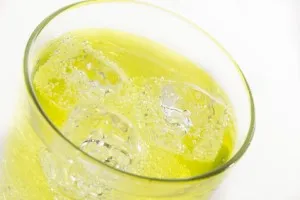Many of us know that not everything labeled as ‘healthy’ lives up to its advertised hype. Sports drinks, for example, along with a host of other summertime beverages, promise to keep us hydrated and healthy, but in reality fall short.
Here is a look at 5 so-called ‘healthy’ summer drinks that leave much to be desired nutrition-wise.
Gatorade
Gatorade is marketed specifically to athletes, with the promise of ‘replenishing electrolytes.’ Replenishing electrolytes means to balance sodium and potassium in the body, along with other elements. Our bodies require twice as much potassium as sodium. If sodium levels are too high, they actually deplete the body’s stored potassium, causing muscle cramps.
A bottle of gatorade contains 2 percent potassium to 12 percent sodium. Essentially, this ratio does nothing to ‘replenish electrolytes;’ instead, it is a recipe for muscle cramps and other possible issues.
What Gatorade does provide is glucose-fructose syrup, which is very similar to high fructose corn syrup, but perhaps in a slightly varied glucose-to-fructose ratio. Either way, unbalanced glucose-fructose ratios are absorbed rapidly into the bloodstream, potentially leading to liver problems, heart disease, weight gain and dementia.
Gatorade also contains trans fats in the form of hydrogenated soybean and cottonseed oils, as well as artificial colors and flavors, many of which have been shown to cause allergic reactions and behavioral disorders in children.
Crystal Light
Similarly to many ‘light’ drinks, Crystal Light contains aspartame, a dangerous compound responsible for 75 percent of adverse food reactions reported to the FDA – ranging from headaches and dizziness to seizures and breathing difficulties.
According to the Center for Science in the Public Interest, aspartame has been associated with cancer. Studies have found that lab animals that were fed aspartame have developed tumors. Another ingredient in Crystal Light, acesulfame potassium, has also been linked to an increased risk of cancer.
Besides the carcinogenic risk factors, Crystal Light contains corn syrup solids, artificial flavors and artificial colors, including Blue 1, Red 40, Yellow 5 and Yellow 6. According to the Center for Science in the Public Interest, Yellow 5 and Yellow 6 are to be avoided, as they are likely carcinogenic.
Vitamin Water
One bottle of Vitamin Water has just about as much sugar as a 12 ounce can of Coke. This is hardly hydrating, and hardly healthy.
In 2010, a lawsuit was brought against the Coca Cola company, the manufacturer of Vitamin Water, claiming that they were making unwarranted claims as to the product’s health. In response, the Coca Cola company released this statement: “no consumer could reasonably be misled into thinking Vitamin Water was a healthy beverage.”
However, many ARE misled, especially since the name indicates vitamins! In truth, the vitamins in vitamin water are minimal, and synthetic, making them difficult for the body to absorb.
Add artificial colors to the mix, and you’ve got a ‘water’ that should certainly be avoided if health is any concern.
Instant Iced Tea
The process used to turn tea leaves into instant iced tea powders destroys the nutrients that the tea provides in its unprocessed form. A study by the USDA found that powdered drinks lost over 90 percent of their original antioxidants, and sometimes all of their antioxidants, during processing.
The Journal of Agriculture and Food Chemistry found that pre-bottled iced green teas do not contain catechins, the beneficial polyphenols present in natural green tea. Instant iced teas often contain BHT or BHA (butylated hydroxytoluene or butylated hydroxyanisole).
These two related preservatives have been linked to organ toxicity, liver, thyroid and kidney issues and allergic reactions. BHA has also been associated with hormonal imbalances and may have carcinogenic properties.
If this weren’t bad enough, according to the School of Medicine, many instant iced tea mixes contain dangerous levels of fluoride, well beyond the ‘safe’ limit set by the EPA. In 2005, a middle-aged woman reportedly suffered severe spinal pain caused by hyper-dense bones, which stemmed from drinking powdered ice tea.
Bottled Fruit Juice

This summer, remember that what you drink will affect how you feel and how much fun you have. Hydrate yourself with pure, filtered water. For a treat, blend up a smoothie of organic fruits and veggies, possibly adding in some coconut crystals or stevia for sweetness.
Adding a fresh-squeezed lemon to a pitcher of water, and adding a bit of stevia, is a delicious way to enjoy lemonade!
Drink smart, and enjoy the sun!
-The Alternative Daily
Sources:
http://www.livestrong.com/article/309079-the-pros-cons-of-crystal-light-drink/
http://www.healthyfutureforkids.com/2007/09/gatorade-not-fit-for-gators-or-kids.html
http://www.huffingtonpost.com/john-robbins/the-dark-side-of-vitaminw_b_669716.html
http://www.organicauthority.com/health/instant-iced-tea-a-refreshing-glass-of-potential-dangers.html
http://www.davidsuzuki.org/issues/health/science/toxics/chemicals-in-your-cosmetics—bha-and-bhti/
http://360yourlife.com/category-health/danger-hidden-in-fruit-juices/
http://www.huffingtonpost.com/dr-mark-hyman/high-fructose-corn-syrup-dangers_b_861913.html
